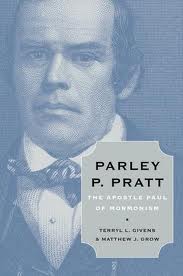-
•
•
18 responses

A close reading of Blake Ostler’s work is timely, and I’m happy to do it alongside of Adam Miller. I’ve left mostly to Adam’s post last week to state what we’re up to and why. I want this week, before we come to the chapter-by-chapter work of this project, to say something about how time has affected Ostler’s project—how the project has changed between 2001 (publication of volume one) and 2008 (publication of volume three). I’ll also have to say a word about how it may change before 2012 is over (publication of volume four). My modus operandi will be… Read More
-
•
•
6 responses

I’ve been a bit remiss in keeping up with my interest (OK, perhaps mania) with Mormons in sports. Baseball selected the newest members to the Hall of Fame early this month, and both men and women’s soccer have had their drafts, but I’ve missed them both. So, its time to catch up. Read More
-
•
•
10 responses

I was gratified to see most of the class come back, but we’ll see if it happens again. Here’s the tentative syllabus for the next few weeks. I was really apprehensive about today, for two reasons. First, the material in this lesson was largely groundwork for the next few weeks, and really shouldn’t stand on its own, because you don’t see the payoff. Time constrained me, though. Second, this is some of the most tentative material I’m working with, and I’m hesitant about some of it. I’m still working it out in my own mind, but this seems to be… Read More
-
•
•
19 responses
Right now, I have 200+ pages of Mitt Romney’s 2010 tax return clogging up my work printer. He’s a Mormon, it’s a tax issue, I’m a tax guy, so there will clearly be a blog post in the near future. Unfortunately, I also have a job and a family and obligations (and did I mention it’s 200+ pages?), so that post may or may not happen in the next couple days. I’ve glanced through really quickly and, even though it’s fascinating, there doesn’t seem to be anything terribly surprising (his effective rate’s a little lower than I expected, but not… Read More
-
•
•
2 responses
The story of Lehi’s family and their travels to the promised land perhaps reaches its height in the crisis point during the storm while they are on board the ship they built. The internal divisions within the family have lead to yet another dispute, and the Lord puts them through a trial to help them work it out. In fact, this is just the last of three stories in this lesson, all showing a similar pattern — and in each case showing faith and diligence (as the lesson describes it), leads to the Lord’s assistance in resolving the trial. Read More
-
•
•
85 responses
Dear Media, Read More
-
•
•
23 responses

Perhaps due to the authoritarian structure of the Church, students at BYU (more than elsewhere?) come to college expecting Pure Truth to be bestowed by The Authorities (i.e. professors) on those less enlightened (i.e. students), instead of learning how to engage data and arguments. I’ve often distributed a collection of readings and articles to students in my Institute and BYU classes. These help introduce and reorient students towards a broader perspective of LDS intellectual engagement, approaches, and critical thinking. Essentially, this is accomplished through stories, historical/doctrinal/cultural engagement, scholarly engagement and explicit guidelines. My “standard packet” has varied a bit from time… Read More
-
•
•
3 responses

“Belief” is more like an armchair anthropologist’s naive explanation of what’s going on with religious people than a description of what actually happens when someone sits in a pew or kneels by a bed. The way the word gets used as shorthand for willful gullibility is all wrong. These days, talking about religious “belief” is often just a tolerant way for non-religious people to make sense of religious phenomena from across the room by, in effect, saying that the religious phenomena they don’t understand don’t really happen. Stuff doesn’t happen at church, people “believe” stuff happens at church! Read More
-
•
•
36 responses

Do Mormons do theology? Sure. Do they do theology qua theologians? Not really. Read More
-
•
•
76 responses

ABC broke the news: Mitt Romney has donated millions of dollars worth of stock to the Mormon church. SEC filings disclose that a Bain partner donated $1.9 million of Burger King stock to the Church; in addition, the Church has received stock of other Bain holdings, including Domino’s, DDi, Innophos, and the parent company of AMC Theaters. But why? Why would Romney give the Church equity stakes in bad fast-food chains, second-rate pizza chains, and other such holdings? Read More
-
•
•
24 responses

How many am I? Read More
-
•
•
19 responses

If there’s sufficient interest, I will post some general notes, handouts and materials here instead of mailing out everything to my class. Handouts are pdf format and have live links embedded. I felt the first week went well; in contrast to the last time I taught this, few students had a science background, and only 1-2 had previous experience with me. I introduced myself and established some formal bona fides. The more important informal trust that comes from personal experience and knowing someone will come over time, I hope. I had students introduce themselves, give a bit of their own… Read More
-
•
•
One response
From a literary point of view the second part of Nephi’s vision, his vision of the future, is very like an epic. It covers a broad sweep of human history and mentions the actions of a series of heroes and heroic groups who have an impact on the fate of humanity. Unfortunately, the broad nature of this epic vision is difficult to cover in a short form, like a blog post or something you might share in a Gospel Doctrine lesson. Read More
-
•
•
Note that I will not be posting notes for lesson #5; I’m taking the week off. (Notes for lesson #6 should be right on schedule, however.) Also note that when I teach this, I plan on covering 1 Nephi 11-15, since I think it makes more sense to treat Nephi’s vision in its entirety and in its context. Read More
-
•
•
13 responses
Times and Seasons has selected Jimmer Fredette as Mormon of the Year for 2011. James Taft “Jimmer” Fredette began 2011 leading BYU’s basketball team to the NCAA championships, leading many to expect that the team might make the later rounds of the playoffs. While those hopes were unrealized (in part due to the sudden withdrawal of BYU’s next most important player, Brandon Davies), BYU’s performance in the tournament set a high point that hasn’t been rivaled by a BYU team since 1981, and Jimmer earned every major National Player of the Year honor, including the Wooden Award, the Naismith Award,… Read More
-
•
•
29 responses
Julie is posting detailed commentary and Kent is providing literary reflection; I’m afraid all I have to offer on the Book of Mormon is general observations. This week let’s talk about situating the book as a whole, not so much in terms of content and form (which I’ll address in later posts) but in terms of function and use. How does the Church use the Book of Mormon? How do you use the Book of Mormon? Read More
-
•
•
5 responses
While perhaps not the most important symbol in the Vision of the Tree of Life (1 Nephi 8-11), the Iron Rod may be the one that has received the most attention, at least in recent decades[fn1]. But I think I was able to find something that kind of fit with the whole vision instead of just mentioning the Iron Rod. I like this hymn for not just (vaguely perhaps) invoking some of the imagery of the vision, but also for placing an emphasis on the Lord’s role in assisting us. Read More
-
•
•
16 responses
This isn’t a lesson; it is the notes from which I will prepare a lesson. Read More
-
•
•
2 responses

“If Pratt wanted to leave for posterity a record of his apostolic role in providential history, he also wanted to leave for futurity the story of the flesh and blood Parley P. Pratt (393).” Regardless of whether we agree with Givens & Grow on this point, it is the lens through which we ought to view their recent biography. Parley P. Pratt: The Apostle Paul of Mormonism is a substantial addition to Pratt’s timeworn autobiography, an attempt to fill out our understanding of the man – both who Pratt was and also the critical (though often overlooked) contribution he made… Read More
-
•
•
13 responses

After taking off 18 months or so, I’m returning to teaching Institute in my free time. Beginning January 12, 8 PM in the Union Square chapel of Manhattan, I’ll be teaching a class called “Genesis, with an Introduction to Studying the Bible in Hebrew.” The Institute Director added the last part, but I don’t mind one bit. I’m quite looking forward to it. Institute can really be a breath of fresh air, especially for those who are looking for a deeper exploration of the scriptures than Sunday School allows. After all, there’s no schedule to follow, no manual to adhere… Read More
-
•
•
4 responses
Case Background: Kiewit Power Constructors Co. contested a National Labor Relations Board decision to reinstate two fired electricians for threatening workplace violence. Kiewit Power had warned the electricians that their breaks were too long, and that they may need to take them in a different location. The electricians responded by saying things would “get ugly” if they were disciplined and the supervisor “better bring [his] boxing gloves.” In reinstating the electricians, the NLRB found the statements “were merely figures of speech made in the course of a protected labor dispute.” Kiewit appealed the decision and case landed in front of the… Read More
-
•
•
41 responses
I enjoyed the holidays this year, but I am glad they are over. The tree is no longer shedding needles in our living room, and the few lights and garlands we hung have been taken down. We celebrated a simple Christmas here, with very few decorations other than the nativities and the tree. We exchanged few gifts. We are trying to teach our children to be thoughtful and discriminating in what they choose to give each other rather than buying every single thing they think (rightly) that their siblings would enjoy. I remember a Christmas ten years ago. We were… Read More
-
•
•
18 responses
The flurry of posts at T&S and elsewhere around the Bloggernacle is a reminder that 2012 is Book of Mormon year in Gospel Doctrine class. Which Book of Mormon are you going to read? Read More
-
•
•
9 responses

(Part 3 of 4. Read the first parts here and here.) Once a year, right before our Christmas dinner, I practice the fine art of pomegranate seeding. If I’d let them my kids would eat pomegranates every day, but they’re expensive. And the juice stains. This year we have two of the fruits, spherical with thick skins of dull red. I choose one and use a serrated knife to saw through its center. The fruit falls in halves on the cutting board, revealing plump clusters of seeds separated by paper-thin pith. Juice seeps from the wound and runs down the… Read More
-
•
•
8 responses
In looking for a literary work to go with the second Gospel Doctrine lesson this year, I was struck by some of the parallels between what Nephi experiences in the first few chapters in the Book of Mormon and what the early Mormons went through in traveling to Utah. Many of those we call the pioneers left comfortable homes, like Nephi and his family, and traveled to a “promised land” “into the wilderness.” And perhaps half or more of the pioneers also had to travel over an ocean to reach the promised land. Read More
-
•
•
29 responses
Again, this isn’t a lesson. It is the notes from which I will prepare a lesson. Sorry it is so long. (The rabbit trail of the week was related to the killing of Laban, but I don’t plan on discussing that with my class.) Read More
-
•
•
34 responses
This post opens the voting for Mormon of the Year. Votes will be taken until midnight Eastern Time on Saturday, January 7th, at which time the voting will close. The voting mechanism will attempt to restrict votes to one per person. The order of the choices is set at random, and is different each time the form is presented. THE WINNER OF THE ONLINE VOTE IS NOT NECESSARILY THE MORMON OF THE YEAR!!! Read More
-
•
•
5 responses

(Part 2 of 4. Read the first part here). Between the Washington Beltway and the Delaware coast lay 150 miles of waiting. Waiting, and watching, and sweating with boredom as my grandmother’s Oldsmobile slowly cruised Route 50. We took this road every summer, me and my brother and our Yia Yia Christine, leaving behind the Maryland suburbs for the Lynard vacation spot on Rehoboth Beach. Read More
-
•
•
9 responses
I’m no stranger to doubt and scepticism – I’m as much a child of conflicted modernity as anyone and it has been years since the majority of those close to me have professed an unwavering belief – and context is as relevant to testimony as anything else. But tonight I want to state candidly and unreservedly: I believe. There’s something genuinely magical (and I feel that quickening magic now) in the bearing of a testimony – I count my experience with testimony as one of the grand mysteries I’ve encountered in life. I can’t help but continually try to cast… Read More
